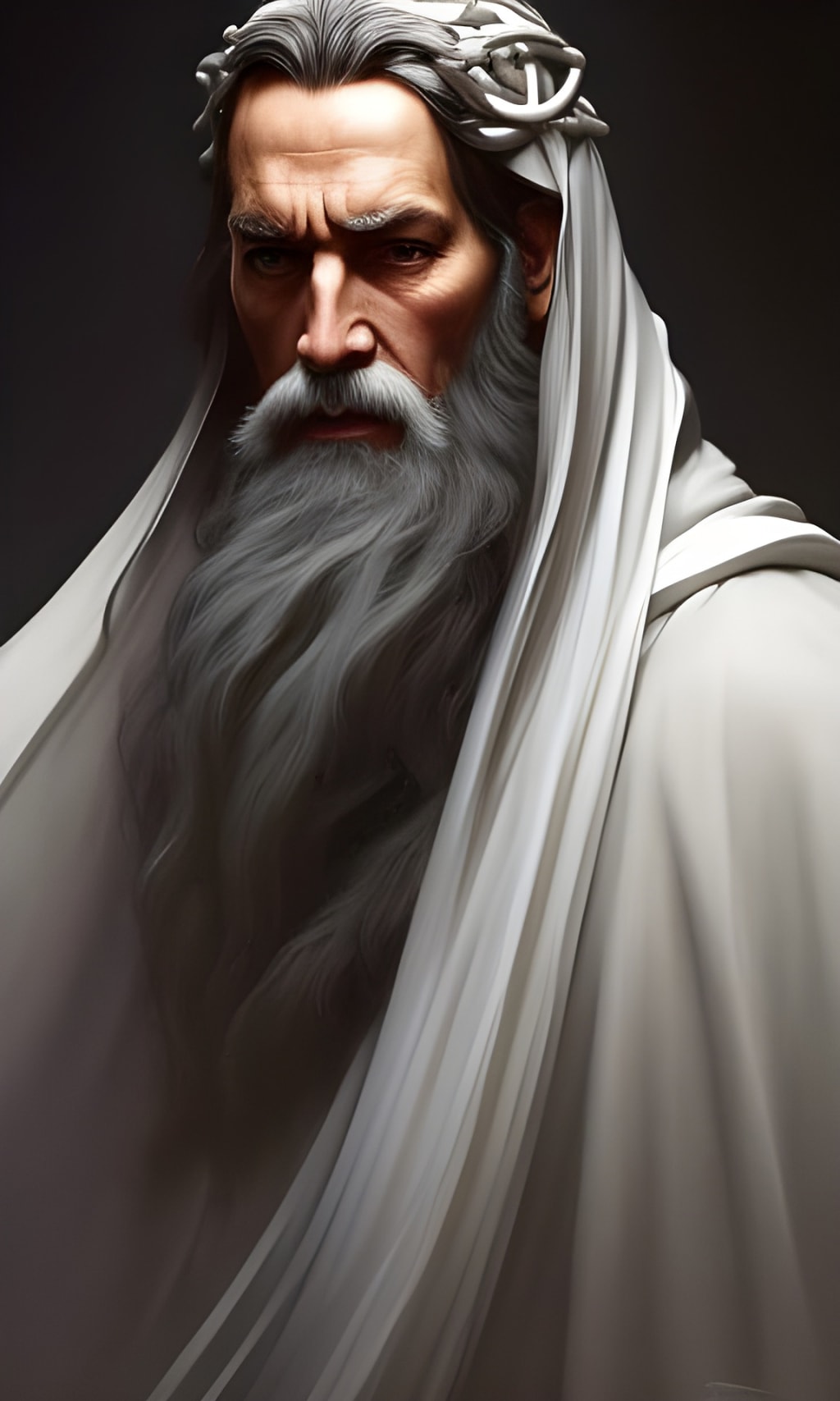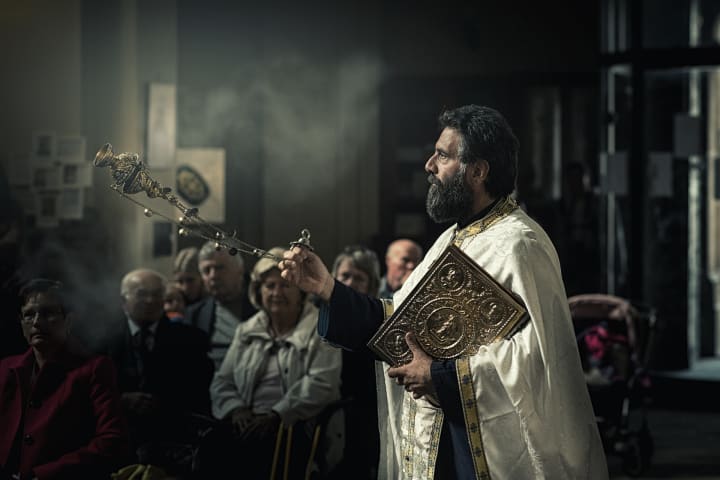5 Cringey Clerics You Meet in Your Gaming Career
Playing in Bad Faith

The cleric is one of the oldest standbys of fantasy RPGs, going all the way back to the earliest editions when it was called the priest. A servant of divine powers, the cleric is given the ability to manifest miracles to aid their allies, turn back abominations, and heal their companions... but if you've ever shared a table with one of these clerics, you might have decided to just load up your pack with healing potions and take your chances without bringing the god botherer along.
Previous entries in this series include:
For more game content you should also check out my gaming blog Improved Initiative, as well as my Vocal archive!
#1: The Proselytizer

Perhaps the most common cringey cleric I've seen in the wild are the proselytizers; characters who insist on telling you all about their patron, why they're so great, and why you should all worship them, at least once per game session.
And if you've never been a part of a table with one of these clerics, I can assure you this is just as irritating as it sounds.
What makes this cleric so frustrating is two-fold. First, this behavior is actually pretty rare in most fantasy RPGs for folks who actually dig into the lore and ask how clerics act. While it's not completely unheard of, most fantasy churches aren't actually interested in recruitment in this way. Secondly, out-of-character, it's just annoying. Unless you develop a good rapport with your table, and can work it naturally into dialogue, it can get really tiring really quickly.
Most of us don't want a lecture about how we need to go to church in the middle of fighting goblins. We got enough of that back in the 80s and 90s.
#2: The God Blamer

We've all heard someone use the phrase, "I'm just playing my character," as a defense of whatever bad behavior they're committing in-game. Whether it's the rogue stealing out of the party treasury, or the barbarian bullying another party member, or the wizard being snide and derisive, the trap card always seems to be that it's the character, not the player, doing these things... so why are they getting all this push back?
The God Blamer takes this a step further by blaming their actions on the divine. They can't help that they have to make these sacrifices, or act in this specific way, because that's what their god demands of them.
As with all the other examples, though, the player is the one who actively decided to make this character, and to play them in this way. They're the ones who chose the god for their cleric to worship, and they're the ones who opted to perform that worship in a way that chafes the rest of the table's patience. The god isn't the one to blame, here.
#3: The Lore Ignorer

Full disclosure, clerics come with a lot of extra reading that most other classes don't have to go through. They need to know the broad strokes of their faith, who their gods' enemies are, what the dos and don'ts of the church are, and depending on your setting this can get pretty exhaustive when it comes to the details.
While cleric players don't need to do all of the reading to play their cleric, they should do at least some of it. And they definitely shouldn't just make stuff up without clearing it with the GM first to make sure that what they're acting on is going to jive with the canon.
Players generally have more leeway with this in homebrew games where the lore can be modified and filled in as the game goes, but when there are canon settings with histories, holy books, church doctrine, and more, it's pretty easy for a character concept to run face-first into a wall. Clerics are meant to be servants of a divine power of some sort (generally speaking), and the typical arrangement is that they're going to keep receiving spells and occasional divine intervention as long as they act in ways their deity approves of. If they start running off the rails, doing things counter to that god's goals, or even helping the god's enemies, it can quickly break immersion if the cleric doesn't lose their powers.
But these particular players will argue with a straight face that their cleric of justice, goodness, light, and mercy should totally be allowed to torture a helpless prisoner because he's a bandit, and he might know something useful.
#4: The Saddle Burr

It takes a great deal of skill and experience for a player to be the odd-character-out in a party in a way that doesn't actively bring down the experience for everyone else. Whether it's a pacifist servant of the church of goodness surrounded by a cohort of bloodthirsty mercenaries, or a cleric of pain and suffering who is accompanying a group of pilgrims on a righteous mission, or a cleric of the god of undeath when everyone else is an undead slayer, party mismatches can quickly lead to frustration.
This is a problem with any character that doesn't jive with the rest of the party, but it can be particularly difficult for clerics who can't read the room. Because while everyone wants to have the gods on their side, they need to be able to find some middle ground between what the cleric's god/doctrine demands, and what the party is actually going to do, if the game is going to progress apace.
#5: The High Horse

While clerics can fill numerous roles, the thing they're best known for is healing their allies. Whether it's making sure the barbarian's wounds are taken care of before the next combat, removing disease from the bard, or restoring the rogue's Constitution damage, the cleric is the one with the power to stitch up all the hurts the party acquires over the course of their adventures.
The High Horse is a cleric who feels that, because they're the one with this power, this makes them the most important character on the board, and everyone who expects their help had better take a knee and kiss the ring.
While there is something to be said for roleplaying situations out, and having in-game conversations regarding player actions that lead to negative consequences, the High Horse is a cleric who treats the game like an organized crime boss. If someone doesn't want to give up a particular magic item, feels the cleric's plan of action isn't a smart move, or doesn't want to be ordered around, the High Horse will shrug and say something like, "Just wait until another skeleton comes along and chops off half your health. Hope you've got a friend around to put you back together when that happens."
Of all the characters on this list, the High Horse is one of the most egregious examples of bad faith play. Because while the cleric's player might be having fun, it's almost a guarantee that no one else will be.
Speaking of The Gods...
For folks who are looking for an interesting take on the divine (and by extension about clerics) consider checking out my Sundara: Dawn of a New Age setting for both Pathfinder Classic and DND 5E. While it's currently in something of an upheaval due to the OGL drama from Wizards of The Coast, the video above provides a general break down of how the divine is different in this setting, and what kind of unique clerics is will allow you to play.
If you're interested then check out:
- Gods of Sundara (Pathfinder and DND 5E)
- Cults of Sundara (Pathfinder and DND 5E)
Like, Follow, and Stay in Touch!
That's all for this week's Fluff post!
For more of my work, check out my Vocal archive, and stop by the YouTube channel Dungeon Keeper Radio. Or if you'd prefer to read some of my books, like my sword and sorcery novel Crier's Knife or my recent short story collection The Rejects, then head over to My Amazon Author Page!
To stay on top of all my latest releases, follow me on Facebook, Twitter, and now Pinterest as well! To support my work, consider Buying Me a Ko-Fi, or heading over to The Literary Mercenary's Patreon page to become a regular, monthly patron. That one helps ensure you get more content, and it means you'll get my regular, monthly giveaways as a bonus!
About the Creator
Neal Litherland
Neal Litherland is an author, freelance blogger, and RPG designer. A regular on the Chicago convention circuit, he works in a variety of genres.
Blog: Improved Initiative and The Literary Mercenary






Comments
There are no comments for this story
Be the first to respond and start the conversation.